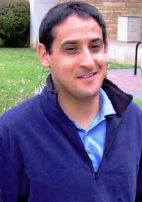Contributor Profiles

Writer
Jeremy Kuzmarov
Long before he earned a PhD in American history at Brandeis University in 2006, Jeremy Kuzmarov was a typical hockey fanatic who loved to play the game and watch his beloved Montreal Canadiens battle NHL rivals at the old Montreal Forum in the 1980s and 1990s.
Kuzmarov is currently Managing Editor of New York-based investigative journalism site ‘CovertAction Magazine’, which focuses on issues of social justice and reports on CIA undercover operations worldwide. Born and raised in west end Montreal, Kuzmarov attended Bialik High School, Dawson College, and McGill University, where he began his writing career as sports editor of The McGill Tribune.
As a youth, Kuzmarov played organized hockey in Cote St. Luc and for the Bialik high school team. Watching his favorite Canadiens players – Mats Naslund of the 1986 Stanley Cup-winning team and Russ Courtnall (who was “a great skater”) – are among his fondest childhood memories.
Although he played for the school hockey team at Brandeis and still plays in a men’s league in Tulsa, Oklahoma, Kuzmarov’s busy writing/editing schedule does not leave much time for hockey these days. He is regularly sought out as an expert on U.S. history and politics for radio and TV programs, as well as co-hosting a radio show on New York Public Radio and on the Progressive Radio News Network called ‘Uncontrolled Opposition’.
A prolific author
He is the author of six books on U.S. foreign policy, including Obama’s Unending Wars (Clarity Press, 2019); The Russians Are Coming, Again, with John Marciano (Monthly Review Press, 2018); Warmonger. How Clinton’s Malign Foreign Policy Launched the U.S. Trajectory from Bush II to Biden (Clarity Press, 2023); and with Dan Kovalik, Syria: Anatomy of Regime Change (Baraka Books, 2025). Kuzmarov has also published hundreds of articles and contributed to numerous edited volumes, including one in the prestigious Oxford History of Counterinsurgency .
Perhaps it should come as no surprise that Kuzmarov seems to have writing in his DNA: his grandmother, Ann Weinstein, was an English professor at Dawson College in Montreal and was a published author who was a devotee of famed novelist Saul Bellow.
[Editor’s Note: BestStory.ca readers can read Ann’s memoir about Saul Bellow posted in June 2013 on our site, as well a background piece about her fascination with the Montreal-born Bellow, who lived most of his adult life in Chicago.]
Kuzmarov can be reached at jkuzmarov2@gmail.com. He is also on substack.

UPDATED:
Published: OCTOBER 2025
How culture and sports mingle in ‘La Belle Province’
Montreal Canadiens hockey: a never-ending love affair!
By JEREMY KUZMAROV
Writing from Tulsa, Oklahoma
Growing up in Montreal in the 1940s and 50s, pretty well every French-Canadian kid playing a pickup game of hockey on a hand-watered rink in the frigid winter air dreamed of being Maurice ‘Rocket’ Richard, one of the most dynamic and prolific goal-scorers in the history of the National Hockey League.
In their home province, the star-studded Canadiens teams of the 1940s, 50s, 60s, and 70s – composed mainly of French-Canadians – were considered to be more than a bladed collection of puck wizards. They were the high priests of Quebec culture – representing the aspirations of French-Canadians who viewed the hockey arena as the proving ground where they could triumph over marginalization endured under two centuries of English-Canadian domination.
As such, no hockey rivalry was – or is – more ferocious than the battles between the Montreal Canadiens and their hated rivals, the Toronto Maple Leafs. The animosity leached beyond the hockey arena into popular, everyday culture as exemplified by the beloved 1979 Canadian classic ‘The Hockey Sweater’ written in French by renowned Quebec author Roch Carrier and later translated into English by Sheila Fischman.
In his autobiographical account, Carrier recounts how as a 9-year-old in 1946 he asked his mother to buy him a new Canadiens hockey sweater stencilled with Rocket Richard’s famous No. 9. What arrived from the primarily English-speaking Eaton’s department store was a Toronto Maple Leafs sweater, which a chagrined Carrier tells readers led to his being ostracized by both his peers and hockey coach.
Carrier’s tale is an allegory illustrating the historical tensions that have simmered between Canadian anglophones and francophones since the Battle of the Plains of Abraham on September 13, 1759 when British forces under Gen. James Wolfe defeated French troops under Gen. Louis-Joseph de Montcalm – leading to British control of North America.
Now, for the first time, veteran Montreal Gazette journalist Brendan Kelly explores how cultural history and sports have merged to create the most dynamic and storied franchise in the National Hockey League: the Montreal Canadiens.
Please join me for a fast-paced review of Kelly’s new – and extensively researched book – titled, Habs Nation: A People’s History of the Montreal Canadiens, tracing the enduring attachment of Quebec hockey fans to the team they reverently refer to as Les Glorieux (The Glorious Ones) and La Saint-Flanelle (The Holy Flannel).
Editor’s Note: Photo above shows a 2017 Canada Post stamp issued in honour of Maurice ‘Rocket’ Richard and the five Stanley Cup-winning teams he played on between 1955 and 1960.

UPDATED:
Published: DECEMBER 2013
Western economic interests fuel dirty, covert war in Afghanistan
By JEREMY KUZMAROV
Writing from Tulsa, Oklahoma
Like a loyal NATO partner, Canada has followed the U.S. into combat in Afghanistan under the guise of building a peaceful civilian society through financial assistance and training programs for the Afghan military and police. But all it has done is prop up a system of warlords, drug smugglers and corrupt politicians, bleeding the Canadian treasury of billions and bringing our young warriors home in body bags or shattered in body and spirit.
['Sports Guy' morphs into serious foreign policy critic:
See Jan. 24, 2014 Notes From The Editor.]
4,995 Words | 15 Photos | 1 Illustration
BUY THIS STORY Recommend to a Friend